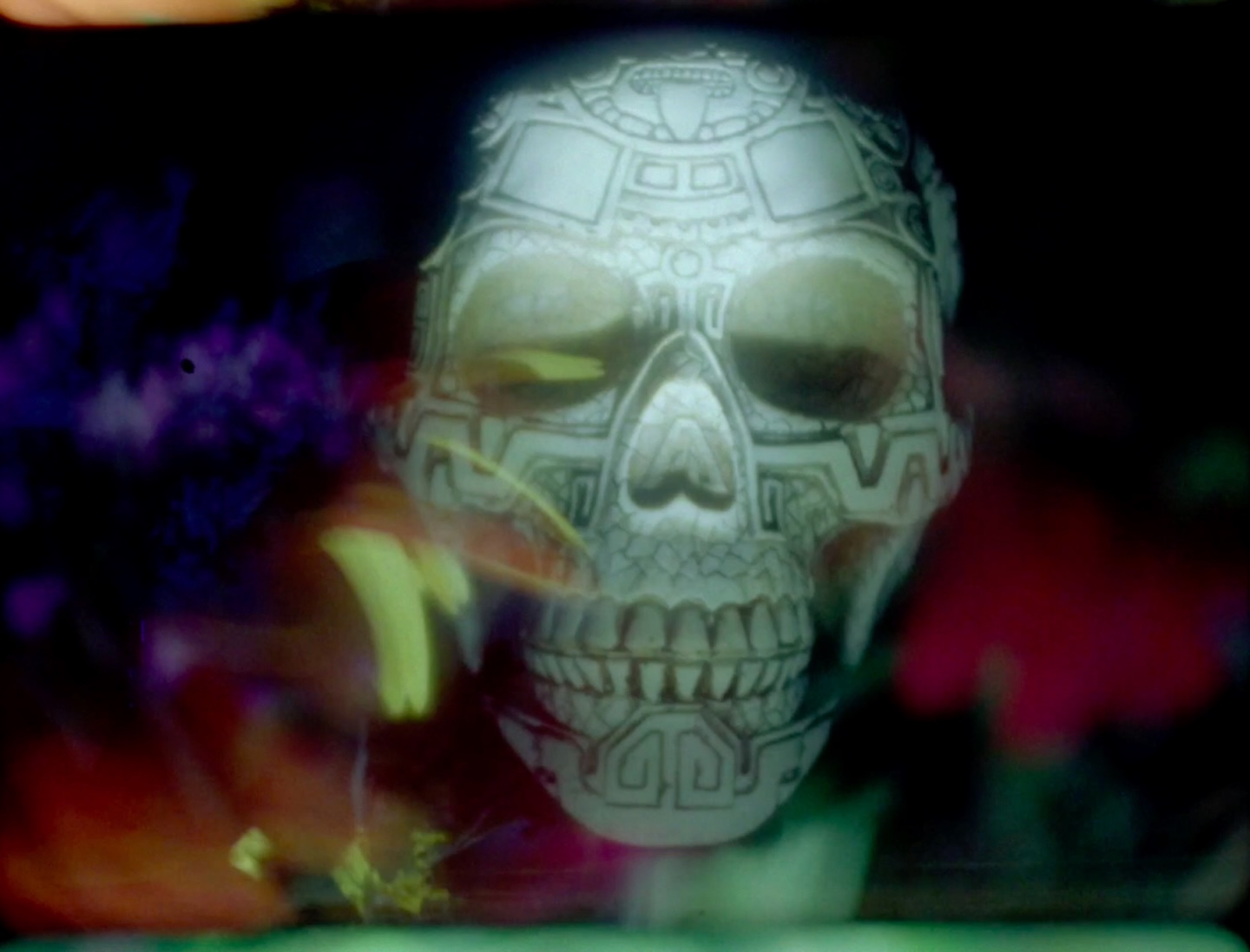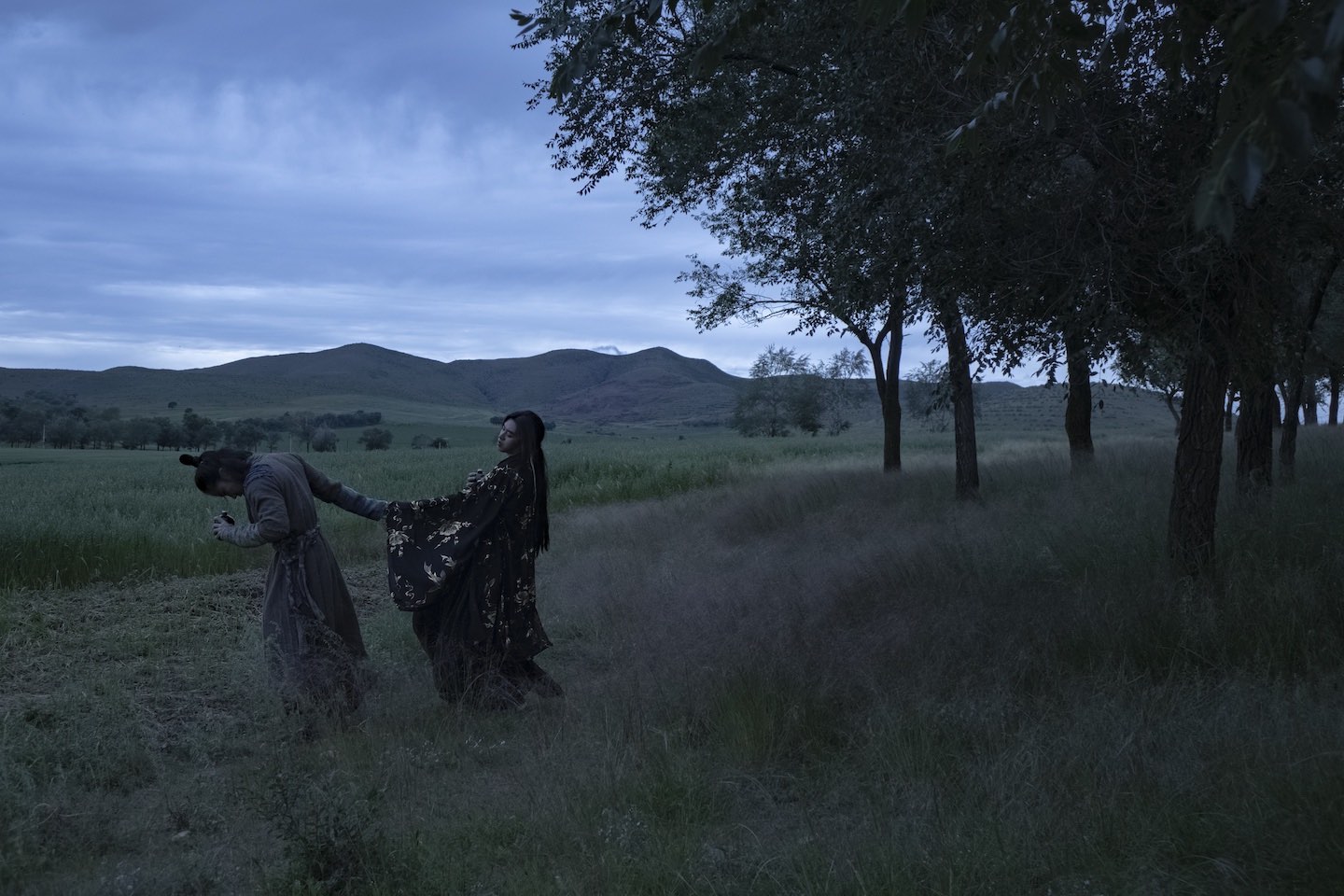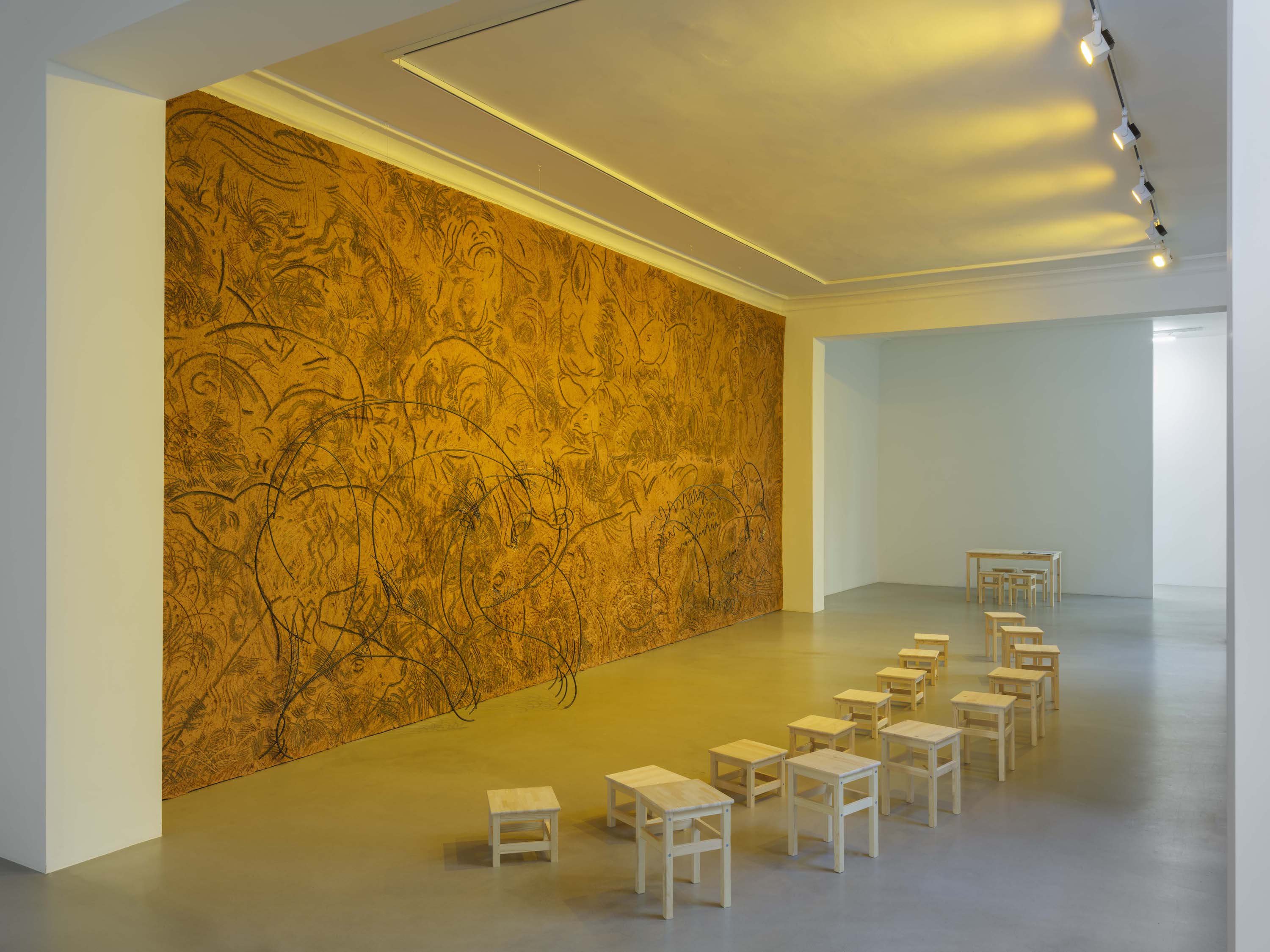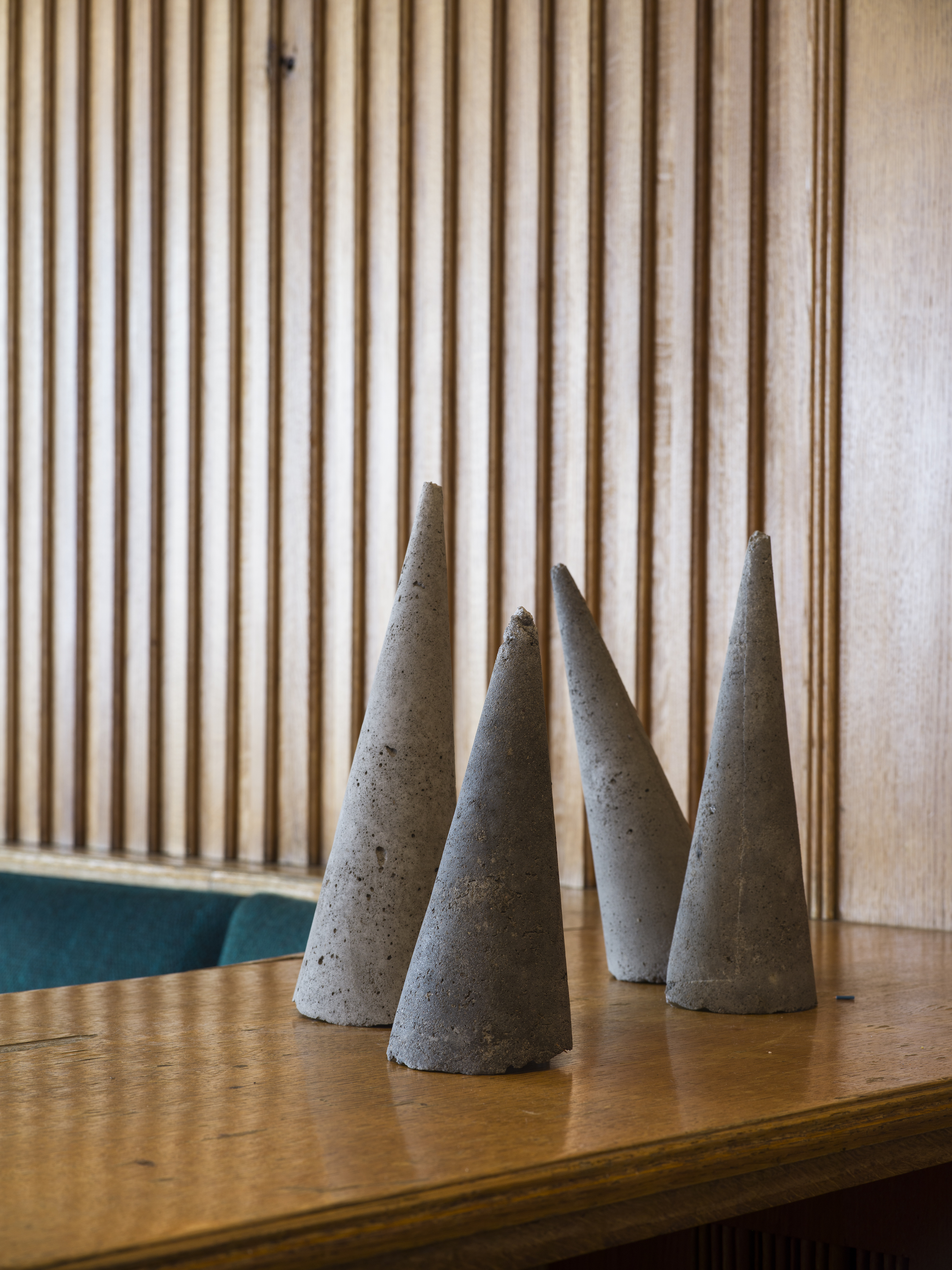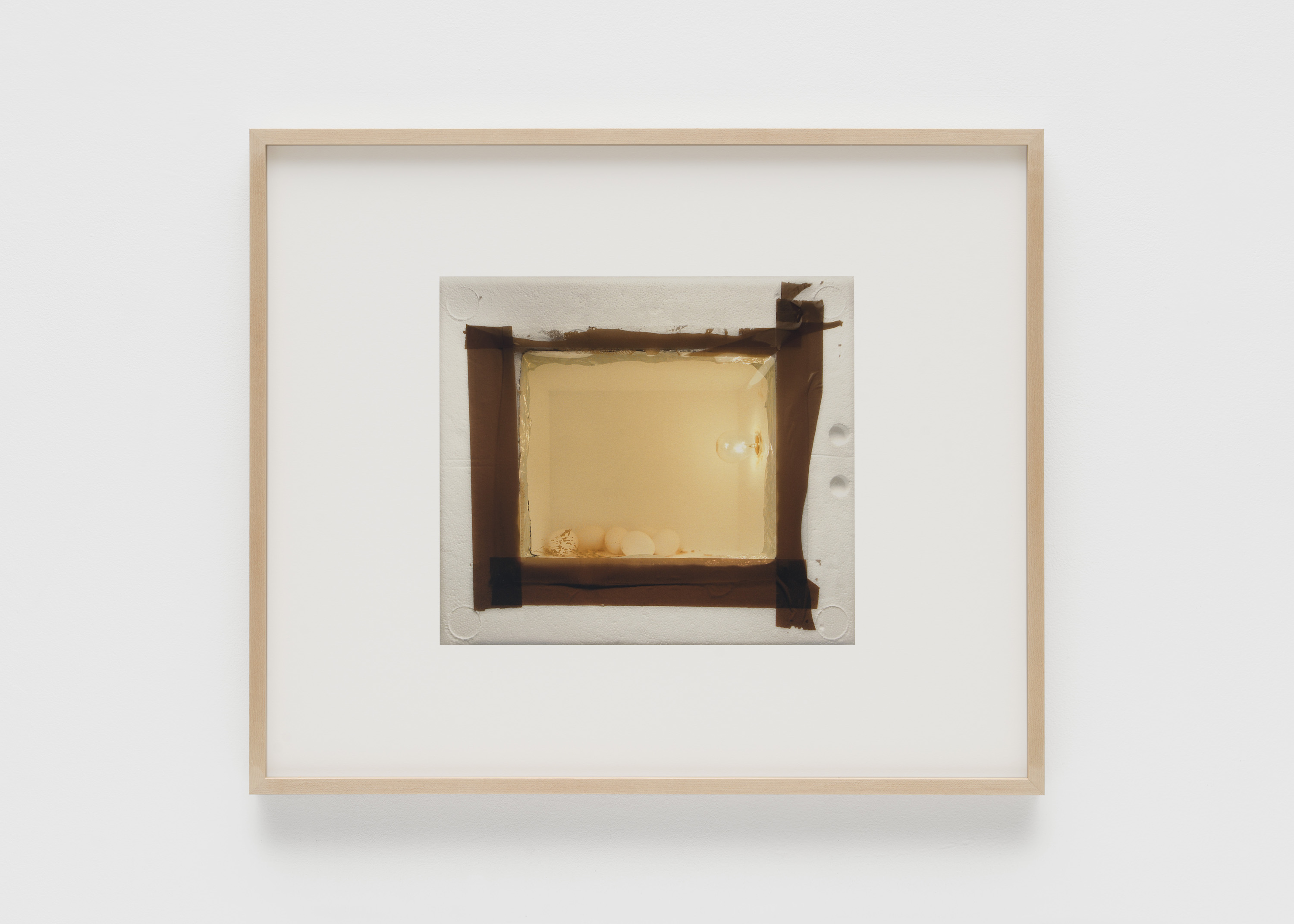November 12, 2021–January 30, 2022
Green is toxic, alienating, envious. Green is hopeful, lush, prosperous. Chromakey backgrounds and laser diodes are green: they can place something somewhere else by using a color that is as natural as it is artificial. The organic and the synthetic meet in green. And it is via an ever-changing strip of electric green, presented on a 17-meter long LED video display, that I first encounter the 2021 Biennale de l’Image en Mouvement, curated by the Centre d’Art Contemporain’s director Andrea Bellini and the New York-based collective DIS (Lauren Boyle, Solomon Chase, Marco Roso, and David Toro, whose 2016 Berlin Biennale polarized opinions and traced generational gaps like few other artistic proposals).
Riccardo Benassi’s Daily Dense Dance Desiderio (DDDD) (2021), a three-minute video loop presented at the Champel Léman station in Geneva, allures biennale visitors and random train commuters alike with its inebriating sound, hypnotic imagery, and poetic reveries. With this installation, the artist turns the station’s calm hallway into a soft rave where semi-abstract images pulsate to the rhythm of a gentle, danceable melody, over which sentences about bodies, technology, and affects float intermittently. DDDD brings together organic, synthetic, and linguistic matter: out-of-focus hands may well be tentacles, iridescent lines of light sunrays, and words oneiric stuff. The work is ecstatic and sensual, and celebrates the collective experiences of pleasure that have been widely denied over the past two years.
Such experience of transformation through abstraction and color is pursued at the Centre d’Art Contemporain, where the Biennale is concentrated, through “Fire” (2021), a series of light sculptures by designers GRAU (Timon and Melchior Grau)—both former students of Hito Steyerl—whose large, pill-shaped floor lamps modulate the darkness of each exhibition level with their soft hues. Yet this sense of intense togetherness is soon broken by an exhibition design that enforces the division, separation, and individualization of artworks (and viewers) in a logic that resembles the alienating, locked-in experience of the pandemic. Conceived as a sequence of 14 rooms divided across the three levels of the art center, this is an exhibition turned into an anonymous hotel: viewers traverse gray corridors and encounter closed doors behind which solipsistic characters inhabit their own, enclosed worlds. As carefully curated and well-conceived as this project may be (and it is), I found this exhibitionary apparatus rigid, even traumatic, particularly at a moment in which healing and solidarity ought to be fostered against solitude and malaise.
While many of these works share an interest in cosplay fantasy and an investment in the creation of parallel realities to address the political, economic, and social dystopias of the present, here they remain isolated, locked inside themselves. Incarnating such solipsism is Hannah Black, Juliana Huxtable, and And Or Forever’s video installation Penumbra (2021), a CGI rendering of the performance of the same name that Black and Huxtable staged at New York’s Performa in 2019, in which animals were tried for their supposed crimes against human order. Speaking over rhythmic dance music, addressing an absent courtroom, asking bizarre questions that want no answers, and referring to actual animals that are nowhere to be seen, this process re-enacts rather than exposes the modalities of western anthropocentrism that legitimized centuries of abuse, incomprehension, and fear of nature.
This jarring is exemplified in a moment when Black’s digital avatar asks flies this pompous question: “Do you deny that you ruin summer?” This question would not have been so out of place in another room, where Emily Allan and Leah Hennessey present Byron & Shelley: Illuminati Detectives (2021), a pilot episode for a television series that portrays Romantic literary heroes Lord Byron and Percy Shelley in the guise of Holmes and Watson, chasing a Sapphic libertine demon. While upturning and critiquing gender roles, the narrative and imaginary sources are nostalgic and revivalist and still rely on a structure which pits white patriarchic intelligentsia (even when not performed by men) against tropes of feminine homoerotic sensuality and esoterism.
Embracing another figure of romantic nostalgia—the teddy bear—Simon Fujiwara’s Once Upon a Who? (2021) is a compelling digital and stop-motion video animation, taking its cue from Dadaistic collage, which explores attachments and constructions of identity. A mellow melody and Fujiwara’s own warm, inquisitive voice accompany the wanderings of a little white bear that recalls Paddington and Winnie the Pooh. Who, the bear, is also who, the digital, consumerist, confused self, lost amidst an overflow of images, brands, messages, and platforms. As so often, the cute quickly turns creepy, creating a wake that trails into the following room (the sole, and very successful, moment of spatial articulation between two works in the show): by opening a door visitors literally find themselves projected onto a wall where Will Benedict and Steffen Jørgensen’s TV series The Restaurant, Season 2 (2021) is being screened.
Here, experimental noise band Wolf Eyes’ dark throbbing beats take over Fujiwara’s berceuse while an ensemble of strange human and not-so-human creatures (Snailien, Earface, Blue Chicken) inhabit a hybrid of reality TV, cooking program, and radio talk show. Edited with a zapping logic, this work also enhances the spirit of the overall exhibition, which replaces focused attention and continuity with a navigator system akin to channel surfing. At the same time, Benedict and Jørgensen’s series suggests the monsters that haunt our present are more real, reliable, and reassuring than the humans around us: here, fiction becomes a mode of resistance to the absurdity of reality. The unsettling effect is compounded in the next room by Theo Anthony’s three-channel installation Neutral Witness (2020), which documents a body-camera training session among the Baltimore police. The gestures and choreographies of control and capture, the relationship between what is spoken and unspoken, and the complexity of the apparel of surveillance make me want to run back to the very weird but sage creatures of Benedict and Jørgensen. In the end, though, I make my way back to the greenish reverie of Champel Station, where Benassi’s latest sentence looms as a cryptic, sensual invitation: “To look into each other’s eyes and find nothing but a bright signal that refers to the mouth.”







